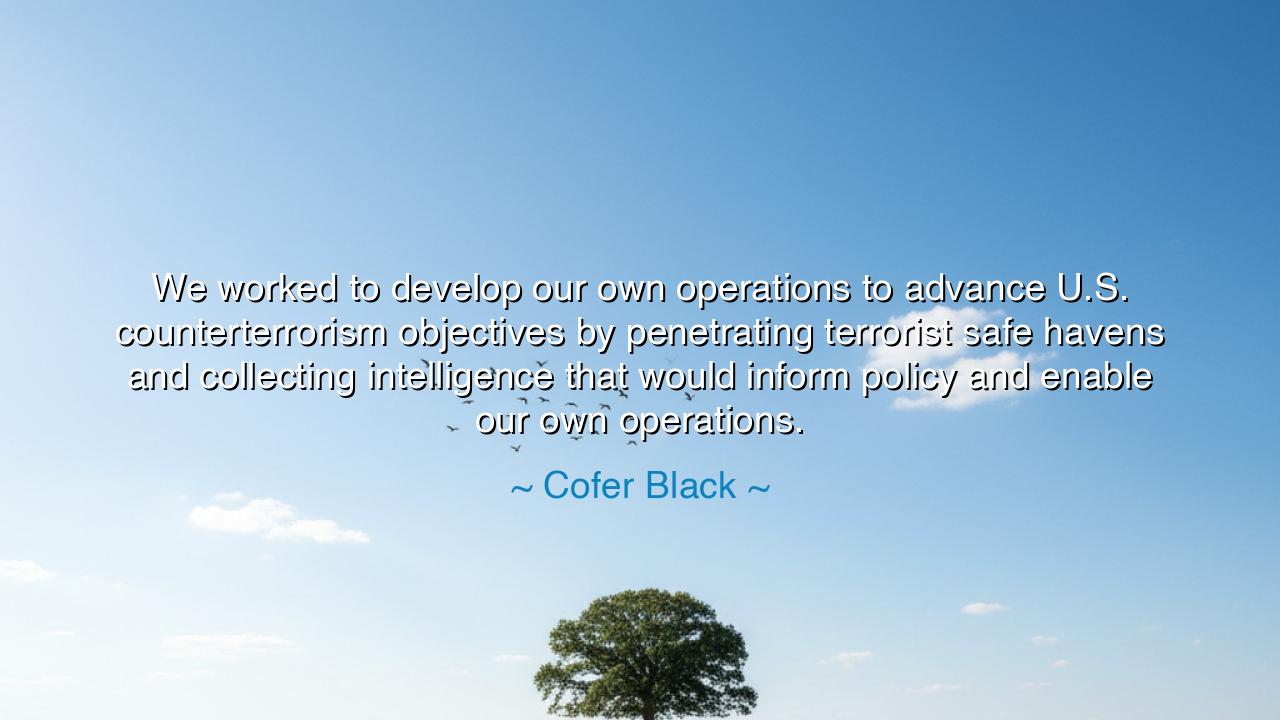
We worked to develop our own operations to advance U.S.
We worked to develop our own operations to advance U.S. counterterrorism objectives by penetrating terrorist safe havens and collecting intelligence that would inform policy and enable our own operations.






“We worked to develop our own operations to advance U.S. counterterrorism objectives by penetrating terrorist safe havens and collecting intelligence that would inform policy and enable our own operations.” Thus spoke Cofer Black, a man who walked in the shadowed corridors of the unseen wars, where decisions are made not in the light of the Senate floor but in the silence of undisclosed rooms. His words, though born from the world of modern espionage, echo the timeless struggle between order and chaos, between the guardians of peace and the sowers of fear. In his statement lies the essence of a truth older than nations—that to preserve life, one must sometimes descend into the depths of danger, armed not only with courage but with intelligence and foresight.
In this quote, Cofer Black speaks from the vantage of his years in the Central Intelligence Agency, where he directed operations at a time when the world teetered on the edge of new and invisible warfare. The old battlefields of armies and flags had given way to the hidden networks of terror, where enemies moved without banners, without nations, and without mercy. To face such an enemy required a new kind of heroism—one not of open valor, but of quiet precision. His words describe the work of those who penetrate the unknown, who enter the safe havens of darkness to uncover truths that may save thousands, though their names are never known.
Such labor recalls the ancient myth of Orpheus, who journeyed into the underworld to reclaim what was lost. Like Orpheus, the agents and analysts of intelligence work must walk through realms of deception and peril, armed only with skill, patience, and unwavering resolve. They do not fight with swords, but with knowledge; their victories are not sung in parades, but written in the margins of secret reports. Yet, their task is sacred—for it is through intelligence that leaders are guided, through information that policies are shaped, and through clarity of vision that chaos is restrained.
Cofer Black’s words were forged in the crucible of the post-9/11 world, when the United States and its allies awoke to a new reality. The towers had fallen, and the illusion of safety was shattered. In that moment, it was not brute force that the world needed, but understanding—knowledge of the enemy, of their hiding places, their intentions, their shadows. Black and those who served beside him sought to collect intelligence, to pierce the fog of uncertainty, and to enable action that was not blind, but guided. His work, though rooted in secrecy, was driven by the ancient warrior’s creed: “Know thy enemy, and know thyself, and in a hundred battles you will never be defeated.”
Yet there is a deeper teaching hidden within his statement, one that extends beyond the realm of warfare. He reminds us that action without understanding is folly. Whether in battle, in governance, or in the journey of one’s own life, the same law applies: to act wisely, one must first see clearly. Knowledge is the foundation of power, but wisdom is the discipline that restrains it. The agents who entered enemy lands did not act in wrath, but in purpose; their mission was not vengeance, but prevention. Thus, Black’s words teach that intelligence—whether of nations or of souls—is the highest form of vigilance.
From this, we may draw a lesson for all who live in uncertain times. Every person, in their own way, must become an intelligence-gatherer in life—one who studies the world, observes the signs, and learns before acting. Blind passion, blind judgment, blind certainty—these are the safe havens of error. Just as nations must know their enemies, so too must we know the impulses that threaten our peace, the fears that guide our decisions, and the illusions that cloud our sight. Penetrate your own safe havens, and seek the truth that lies within.
Therefore, let this teaching be your armor: knowledge is vigilance, and wisdom is strength. Act not in haste, but in clarity. Seek to understand before you strike, whether your battlefield lies in the boardroom, the family, or the nation. And remember Cofer Black’s creed—that even in a world of uncertainty and shadow, those who work with purpose and intelligence preserve the light for all. For the world will always need watchers—those who dare to walk the dark paths so that others may walk in peace.






AAdministratorAdministrator
Welcome, honored guests. Please leave a comment, we will respond soon